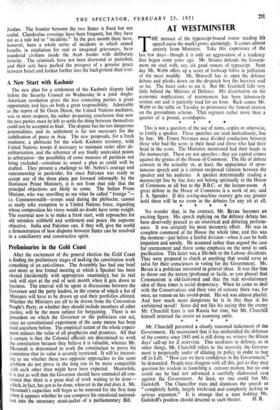- AT WESTMINSTER
THE menace of the typescript-bound orator reading hie speech (save the mark) grows alarmingly. It comes almost entirely from Ministers. Take this experience of the last few days—though it is only an aggravation of a tendency that began some years ago. Mr. Strauss defends the Govern- ment on steel with, say, six good ounces of typescript. Next day Mr. Webb offers up a score of foolscap folios in palliation of the meat muddle. Mr. Shinwell has to open the defence debate and planks down on the despatch box the heaviest wad so far. The heart sinks to see it. But Mr. Gaitskell falls very little behind the Minister of Defence. His dissertation on the economic implications of rearmament has been laboriously written out and is patiently read for an hour. Back comes Mr. Webb to the table on Tuesday to pronounce the funeral oration on the groundnuts scheme. That registers rather more than a quarter of a pound, avoirdupois.
This is not a question of the use of notes, copies or otherwise, to fortify a speaker. These speeches are read meticulously, line by line. Mr. Ernest Newman once divided conductors between those who had the score in their head and those who had their head in the score. The Ministers mentioned had their heads in the manuscript. These are not speeches ; they are capital crimes against the genius of the House of Commons. The life of debate consists in the actuality or, at least, the appearance of spon- taneous speech and in a certain reciprocal relation between the speaker and his audience. A speaker determinedly reading a manuscript line by line does not belong spiritually to the House of Commons at all but to the B.B.C. or the lecture-room. A great debate in the House of Commons is a work of art, said J. A. Spender. If this sewing-machine oratory gets any greater hold there will be no room in the debates for any art at all.
No wonder that, in the contrast, Mr. Bevan becomes an exciting figure. His speech replying on the defence debate has been deservedly praised as an oratorical and debating perform- ance. It was certainly his most mesmeric effort. He was in complete command of the House the whole time, and this was the moment—just before a fateful division—when it can be both impatient and unruly. He assumed rather than argued the case for rearmament and threw some emphasis on the need to seek pacification. This latter was a life-belt to the Labour dissidents. They were prepared to clutch at anything that would serve as salve for their consciences in voting for the Government. Mr. Bevan is a politician interested in general ideas. It was like him to throw out the notion (profound or facile, as you please) that Communism is old-fashioned and that the real revolutionary idea of these times is social democracy. When he came to deal with the Conservatives and their vote of censure there was, for once, no venom on his sword-point. His wit was almost playful. And how much more dangerous he is in this than in his embittered mood! Some did not like his saying that the enemy Mr. Churchill fears is not Russia but time, but Mr. Churchill himself returned the orator an assenting smile.
Mr. Churchill presented a closely reasoned indictment of the Government. He maintained that it has mishandled the defences of the country since 1945 and is still doing so, witness the fifteen days' call-up for Z reservists. This weakness in defence, as in other things, Mr. Churchill refers to the necessity the Govern- ment is perpetually under of diluting its policy in order to buy off its Left. " How can we have confidence in the Government," he demanded. People may disagree with all this, just as they may question his wisdom in launching a censure motion, but no one could say he had not advanced a carefully elaborated case against the Government. At least, no one could but Mr. Gaitskell. The Chancellor rises and dismisses the speech as " completely feeble, largely irrelevant and completely lacking in serious argument." It is strange that a man holding Mr. Gaitskell's position should descend to such bluster. H. B.






































 Previous page
Previous page